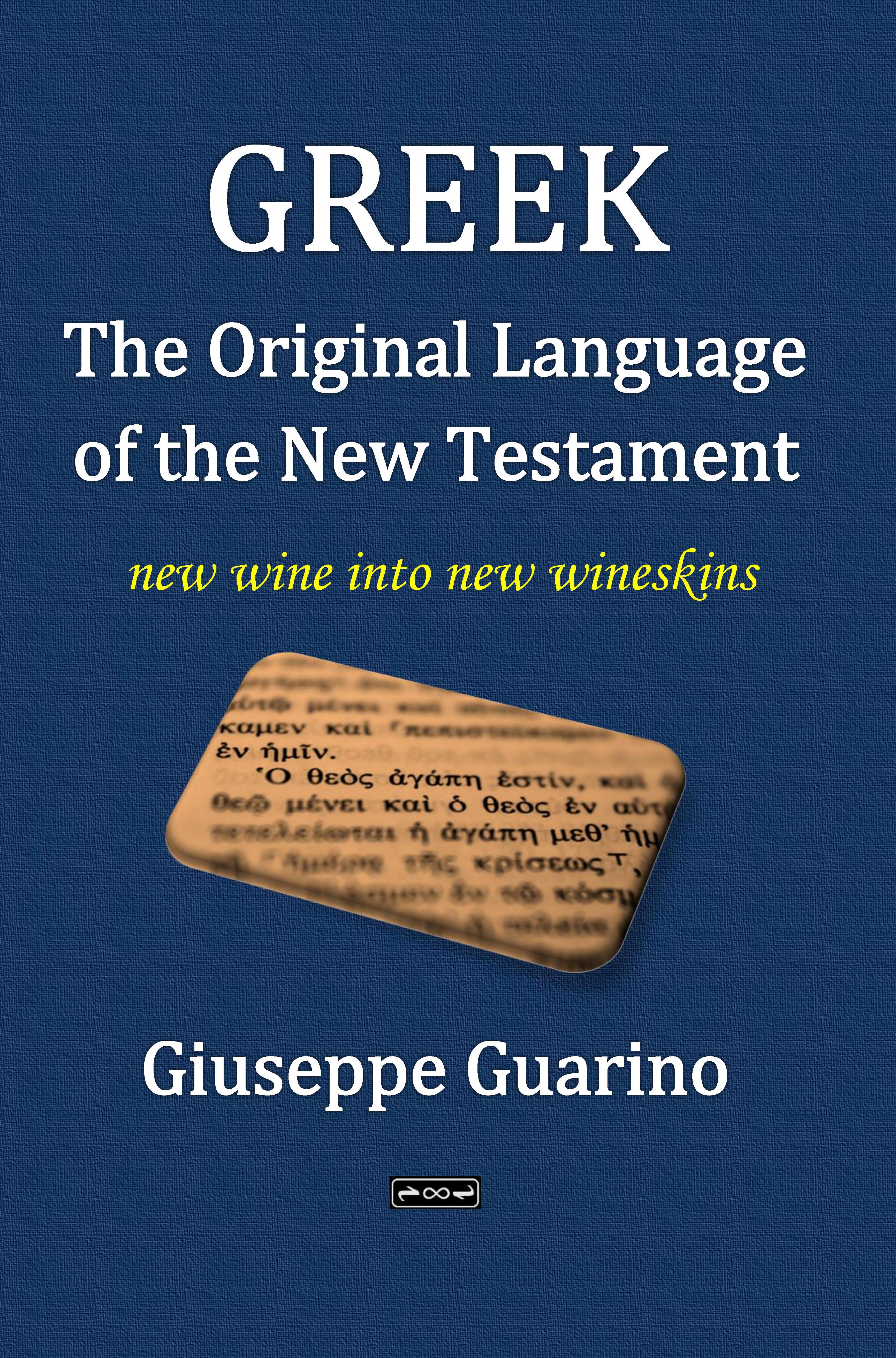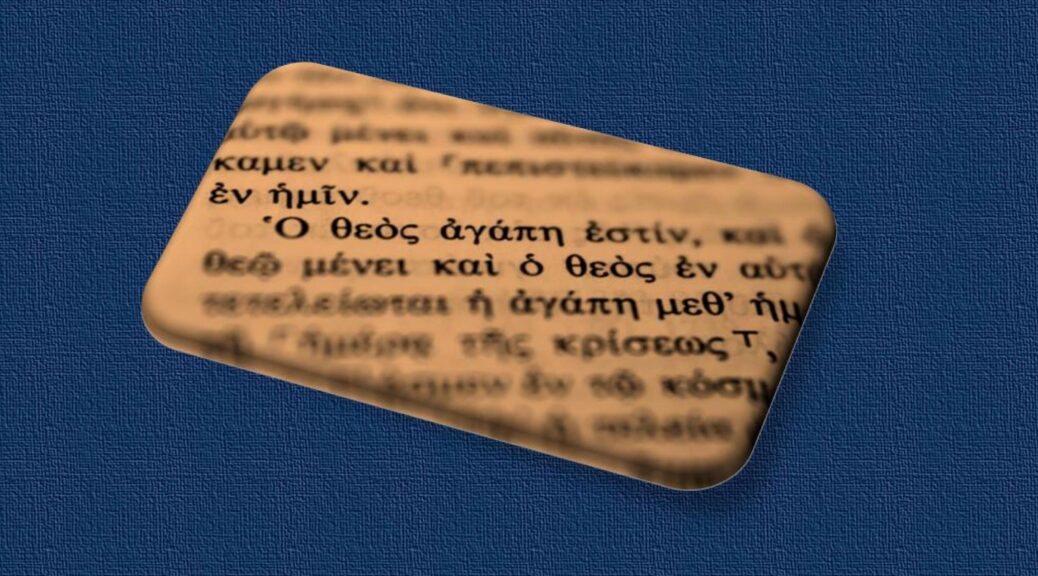 |
click on the cover to buy the book |
by Giuseppe Guarino
Paul and Luke in “Greek, the Original Language of the New Testament”
Paul was the Apostle sent to the Gentiles, the non-Jewish people, to proclaim the Gospel.
The common language of most of the people he entered in contact with was Greek. This was the language of most of the recipients of his letters. Nothing was more consequential for him than writing in Greek. He also wrote with the clear intention that his epistles should be distributed and read among the churches.[1]
Paul was a Jew and a Roman citizen. He was a Pharisee, but at the same time at home with Hellenic literature and culture.
He could stand boldly before the citizens of Athens and speak to them not only in their language, but also in their frame of mind.
In fact, when presenting the Gospel he did not quote the Old Testament at length like Stephen did when witnessing to the Jewish community, but used a rhetorical and even philosophical speech to which his listeners might be familiar with and be open to.
Paul wrote thirteen letters, more technically called epistles, because of their contents. I am convinced he was the author of the Epistle to the Hebrews too – which is not properly speaking a letter, or even an epistle, but resembles more a treatise.
Then, if we want to start our discussion with what we know, we’ll say that Ephesians, Colossians, Philippians must have been written in Greek. Writing in Hebrew would have not served Paul’s purpose at all. This is a fact.
Writing to a church in Rome made sense only if done in Latin or Greek.
Philippi, Thessalonica, Corinth … were all Greek speaking towns. The Galatians were inhabitants of Asia Minor, along with the Ephesians and the Colossians.
Also, the Greek of these writings has always been the undisputed original language of the autographs of Paul since the birth of Christianity.
This should win the case for Greek autographs for the epistles of Paul without any need of further enquiry.
The Epistle to the Hebrews is a case of its own.
Some suppose that it was originally written in Hebrew and only subsequently translated into Greek. Probably by Luke or someone belonging to Paul’s circle.
There is something I ask myself: if Hebrews had originally been written in Hebrew, it follows that the autograph must have been copied and spread in its original language among Jewish converts. Well, why is there only one Greek version of this book?
If one was able to translate it and impose his translation to all the churches, to the extent of obliterating the memory of the existence of an original in another language, he must have been either the author or someone whose work received sanction by him.
We can speculate on this matter as long as we want, but suggestions and theories won’t change the FACT that this epistle or treatise has travelled in time and been delivered to our generation, and the many generations of believers before us, in a Greek original.
This is the only original we have, and the only original recognized as such by the Church.
Even if we imagined it to be an official, authorized translation of a supposed Hebrew original, can it be considered less original than the autograph?
I invite the reader to consider some simple facts.
I am writing this book in English, though I was born and raised in Italy, where I still live.
Over ninety percent of Italians – if there are any at all – interested in this topic will be educated enough to read this book in English, so it is basically useless to work at an Italian version of it.
I have written many books in Italian. Some of these are available in English, too. I wrote some books in both languages: are both editions not originals?[2]
When I write in Italian I have in mind the books I studied in English. I quote from them, providing a translation in Italian myself, when I have none available – which happens most of the times.
When I write in English, I have some Italian books in mind, too. When no translation into English is available, I either paraphrase and tell the reader where I took the idea from or simply try to translate as best as I can.
I believe this is exactly what the early New Testament writers must have done when writing in Greek, being Jews with a Jewish background, culture and language.
What if Paul wrote Hebrews in his native tongue for a circle of new believers? Then, Paul himself or one in his team, so to say, translated it into Greek, possibly as he kept an eye on the work? Is this translation not an authorized translation destined for a wider distribution in churches?
If we are in the field of speculations, please let me speculate too.
The apostle Paul is behind the composition of most of the New Testament.
Even Luke’s work is connected to his ministry.
Luke wrote a Gospel and the book of the Acts of the Apostles.
In my opinion, the introductions to both the Gospel and the book of Acts leave little or no room for the Hebrew/Aramaic original speculations for either of the two books.
The prologue of Luke is written in a pretty sophisticated Greek – almost the level of Classical Greek. The mentality displayed is purely Hellenistic too. Yet, later on in this writing, a peculiar literary phenomena takes place: Semitisms appear.
I believe they must be seen as:
- Evidence that the author has actually fulfilled his initial promise to rely on first hand evidence for the story he was about to tell.
- The sources that Luke had at his disposal must have been written in a Semitic language, whether Hebrew or Aramaic, or both.
- Luke translated from Hebrew to Greek using a literal way of rendering phrases and concepts, being perfectly in line with his times.
His work is the perfect expression of the use of the Greek language to spread the Gospel among the Gentiles.
It was a sign in itself of the passage from the national relationship of God with Israel to the new era of Grace and Truth in Jesus Christ for the whosoever’s.
Luke worked with Paul to preach the Gospel to the Gentiles. Paul was a giant in education and spiritual discernment. He was able to write a masterpiece that changed the history of mankind like Romans. He loved education so much that he traveled with his books[3]. No wonder Luke felt the need to provide a written historical background for the doctrinal dissertations of his companion.
The Gospel of Luke must have been written very early. And very early it must have achieved notoriety.
Paul openly states in a passage of his second epistle to the Corinthians: “And we have sent with him the brother whose praise is because of the gospel throughout all the churches.” (2 Corinthians 8:18 – the translation is mine)
The above is the natural, literal translation of this passage, though some versions may not agree. We all know that the dative in Greek can be translated: “by reason of the gospel” or “because of the gospel.”
The passage makes sense when we simply read for what it says: Luke was famous in the churches because of the gospel that he had written.
Literal versions simply keep the dative “in”, but the sentence remains obscure. But if we just read the passage and are willing to understand what it says – whatever it says – the above translation is perfectly consistent.[4]
“Such an early reference to a Gospel? A written Gospel?” Some may wonder or ask.
“Yes, why not?”
“Was the Gospel of Luke actually written so early?” Some may insist.
“Well, evidently.”
The problem with the above mentioned passage (2 Corinthians 8:18) is not in the Greek itself or the difficulty in its translation, but that reading and translating it literally, we understand that the Gospel of Luke was written earlier than critics suppose it must have been.
Unfortunately, I believe that as far as it possible to do so, when we read the New Testament our preconceptions must not interfere. And when we translate we must do it as faithfully as we can and then believe it.
We all know that the heretic Marcion, because of his gnostic views on the Old Testament, received as Scripture only the letters of Paul and the Gospel of Luke.
This is also very good evidence in favor of Greek originals, since, when opposing him no-one ever mentioned a Hebrew original for these apostolic writings.
In conclusion, there is no external evidence in support of the existence of non-Greek originals for the writings of Paul and Luke.
_____________________________
Notes
[1] “I charge you by the Lord that this epistle be read to all the holy brethren.” (1 Thessalonians 5:27 – NKJV)
“Now when this epistle is read among you, see that it is read also in the church of the Laodiceans, and that you likewise read the epistle from Laodicea.” (Colossians 4:16 – NKJV)
[2] This fact will be to be considered later in the book when we will discuss about the Gospel of Matthew.
[3] “Bring the cloak that I left with Carpus at Troas when you come – and the books, especially the parchments”. (2 Timothy 4:13)
[4] This is the Greek original: “συνεπέμψαμεν δὲ μετ᾿αὐτοῦ τὸν ἀδελφὸν οὗ ὁ ἔπαινος ἐν τῷ εὐαγγελίῳ διὰ πασῶν τῶν ἐκκλησιῶν·”
Literal versions, translate the passage keeping the “in”, leaving room for possible interpretations but being a bit obscure to the average Bible reader.
ASV: “And we have sent together with him the brother whose praise in the gospel is spread through all the churches.”
KJV: “And we have sent with him the brother, whose praise is in the gospel throughout all the churches.”
NKJV: “And we have sent with him the brother whose praise is in the gospel throughout all the churches.”
More recent and less literal versions try to make the meaning clearer, but are biased by the scholars’ ideas about the late date of Luke.
NIV: “ And we are sending along with him the brother who is praised by all the churches for his service to the gospel.”
“Service” is not in the text.
AMP: “And we have sent along with him the [a]brother who is praised in the gospel [ministry] throughout all the churches”
“Ministry” is not in the text.
NASB: “We have sent along with him the brother whose fame in the things of the gospel has spread through all the churches”
“The things” is not in the text.

